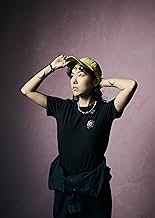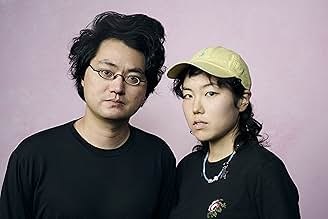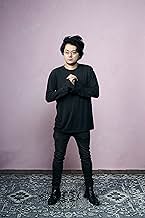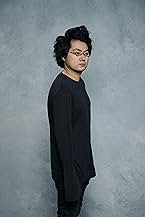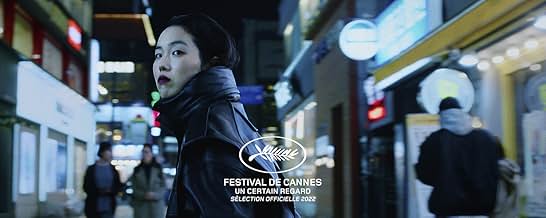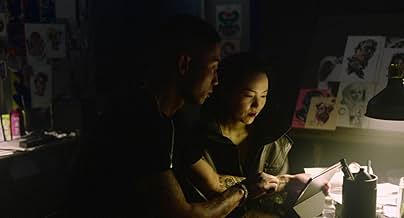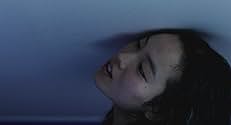CALIFICACIÓN DE IMDb
6.9/10
9.9 k
TU CALIFICACIÓN
Una Francesa de veinticinco años regresa por primera vez a Corea, el país en el que nació antes de ser adoptada por una pareja Francesa. Decide buscar a sus padres biológicos, pero su viaje ... Leer todoUna Francesa de veinticinco años regresa por primera vez a Corea, el país en el que nació antes de ser adoptada por una pareja Francesa. Decide buscar a sus padres biológicos, pero su viaje da un giro sorprendente.Una Francesa de veinticinco años regresa por primera vez a Corea, el país en el que nació antes de ser adoptada por una pareja Francesa. Decide buscar a sus padres biológicos, pero su viaje da un giro sorprendente.
- Dirección
- Guionistas
- Elenco
- Premios
- 10 premios ganados y 25 nominaciones en total
Heo Jin
- Grandmother
- (as Jin Heo)
Régine Vial
- Gisèle Benoît
- (as Régine Vial Goldberg)
Shin Dong-ho
- Tena's Father
- (as Dong-ho Shin)
Opiniones destacadas
Return to Seoul is an ambitious film, telling the story of a young woman named Freddie, who was born to Korean parents, but grew up in France. She - you guessed it - returns to Seoul, partly motivated to search for them, in her early to mid-20s. From there, the movie plays out sort of the way you'd expect for a while... until it makes some interesting narrative decisions, spanning far more time than I'd expected it would. As such, we get an insight into Freddie and the ways she changes throughout her 20s and into her early 30s.
Tonally, it's very different from The Worst Person in the World, but I got flashes of that film from this; maybe it scratched a similar itch. Each looks at a troubled & flawed, yet interesting, compelling, and sympathetic young protagonist, each spans quite a long period of time, each explores loneliness and the trials and tribulations of early adulthood in a very hard-hitting way, and each is quite visually striking. But like I said, they're tonally different, given Return to Seoul is more of a straightforward drama than a romantic-dramedy, and it gets darker and more in-depth with its exploration of loneliness (which hits extra hard, given what the world's been through since the start of the 2020s).
It's not always clear where the film is going, and some of the decisions it makes are quite jarring (though most work for the story and characters, once the shock wears off). The pacing is quite slow, but the compelling main character, the visually pleasing look of the film, and the amazing acting kept me engaged for almost all of its two-hour runtime. Park Ji-Min gives one of the best performances of 2022, and I was shocked to read this is her first ever movie. A performance like this that's so central makes or breaks this kind of character-focused film, and thankfully, she's up to the task and then some.
This might not be everyone's cup of tea, but I liked it a lot. While it was deliberately-paced, it never lost me, and I found some of the scenes quite moving. It's a very good movie; hopefully it won't go under too many people's radars, as Awards Season ramps up.
Tonally, it's very different from The Worst Person in the World, but I got flashes of that film from this; maybe it scratched a similar itch. Each looks at a troubled & flawed, yet interesting, compelling, and sympathetic young protagonist, each spans quite a long period of time, each explores loneliness and the trials and tribulations of early adulthood in a very hard-hitting way, and each is quite visually striking. But like I said, they're tonally different, given Return to Seoul is more of a straightforward drama than a romantic-dramedy, and it gets darker and more in-depth with its exploration of loneliness (which hits extra hard, given what the world's been through since the start of the 2020s).
It's not always clear where the film is going, and some of the decisions it makes are quite jarring (though most work for the story and characters, once the shock wears off). The pacing is quite slow, but the compelling main character, the visually pleasing look of the film, and the amazing acting kept me engaged for almost all of its two-hour runtime. Park Ji-Min gives one of the best performances of 2022, and I was shocked to read this is her first ever movie. A performance like this that's so central makes or breaks this kind of character-focused film, and thankfully, she's up to the task and then some.
This might not be everyone's cup of tea, but I liked it a lot. While it was deliberately-paced, it never lost me, and I found some of the scenes quite moving. It's a very good movie; hopefully it won't go under too many people's radars, as Awards Season ramps up.
Inspired by the life of Laure Badufle, the screen-writer, "Return To Seoul" takes us on a journey of regret, anger, sorrow and wondering what could have been. This film puts an exciting spin on the "adoptee wants to find their biological parents" genre with its depiction of all of the stages Freddie, the protagonist, goes through on her journey of reconciling with her biological parents and also finding her own identity. Davy Chou, the director, captures incredibly Freddie's stance on reuniting with her father, which shows that she is torn between wanting to meet him and being angry with him for giving her up in the first place - this ambivalence keeps the whole narrative thrilling in an otherwise slow pace/slow burn picture like this. What I must appreciate is the truly realistic approach to the legislative side of how adoptees can find their parents, that helps the film being believable. Also I completely admired the striking performance of Park Ji-min in the titular role and I couldn't believe that this was actually her first film ever.
What stands out the most about this film is its refusal to take the easy route. While viewers may think they can predict the direction after the first act, they are mistaken. The narrative defies predictability, mirroring the unpredictable nature of wounded souls and those who never feel truly at home.
The protagonist's actions may seem foolish, but what truly captivates is the striking humanity portrayed with raw realism, making it impossible to abandon the desire and hope for her to find solace within. I was left speechless when I found out that this is Ji-Min Park's debut role. A role that made me shed tears on more than one occasion and that is her merit in making us see so well that everything she is, is the result of her life's circumstances.
The experiende Oh Gwan-rok, in the role of the biological father, is also outstanding, but this is not just a film of performances. It boasts brilliant scenes, expertly paced storytelling, daring technical choices, and a secure, risk-taking direction, all complemented by a flawless soundtrack.
PS: The main theme of this and the one of "Decision to Leave" are two haunting melodies that linger in my mind, compelling me to delve deeper into the history of South Korean music.
The protagonist's actions may seem foolish, but what truly captivates is the striking humanity portrayed with raw realism, making it impossible to abandon the desire and hope for her to find solace within. I was left speechless when I found out that this is Ji-Min Park's debut role. A role that made me shed tears on more than one occasion and that is her merit in making us see so well that everything she is, is the result of her life's circumstances.
The experiende Oh Gwan-rok, in the role of the biological father, is also outstanding, but this is not just a film of performances. It boasts brilliant scenes, expertly paced storytelling, daring technical choices, and a secure, risk-taking direction, all complemented by a flawless soundtrack.
PS: The main theme of this and the one of "Decision to Leave" are two haunting melodies that linger in my mind, compelling me to delve deeper into the history of South Korean music.
Return to Seoul: A stranger in a strange land, adopted as a bay from South Korea and raised in France, 25 year old Freddie (Ji-Min Park) returns. It is a bit of a culture shock but she quickly makes friends. She is persuaded to contact her birth parents through the adoption agency and eventually her father responds. All does not go swimmingly especially as Freddie's free spirit clashes with Korean reticence and patriarchal norms. Freddie herself however is self-centred and even cruel to friends and family. The film captures snapshots her life for her first two weeks as an returnee in Korea, two years later, five years after that and finally a year later, eight years since her first return visit. She develops in some ways, degenerates in others. An interesting tale of loss, acceptance, search for identity and longing on the part of Freddie. Directed and written by Davy Chou. 8/10.
The film offers a fresh and nuanced perspective on the complexities of identity, home, and emotional upheaval. The central character's multi-year quest to return to her place of birth serves as an intense focal point for exploring the intricate emotions and challenges related to adoption and self-discovery. However, a minor drawback lies in the occasional reliance on clichés, which briefly detract from the otherwise innovative approach.
The narrative structure stands out for its inventiveness, seamlessly weaving multiple timelines in a way that enriches the emotional landscape. The fragmented narrative is both audacious and purposeful, reflecting the protagonist's evolving inner world.
Beyond visual appeal, the film's cinematography serves as a narrative tool, adding layers of meaning to characters and themes. The score acts as the emotional backbone, elevating key moments and offering another layer to the viewer's experience.
In summary, the film emerges as a deeply affecting and intellectually stimulating exploration of identity, adoption, and the pursuit of true belonging. With its compelling storytelling, captivating performances, and visually arresting cinematography, it provides not just entertainment but a profound cinematic experience.
The narrative structure stands out for its inventiveness, seamlessly weaving multiple timelines in a way that enriches the emotional landscape. The fragmented narrative is both audacious and purposeful, reflecting the protagonist's evolving inner world.
Beyond visual appeal, the film's cinematography serves as a narrative tool, adding layers of meaning to characters and themes. The score acts as the emotional backbone, elevating key moments and offering another layer to the viewer's experience.
In summary, the film emerges as a deeply affecting and intellectually stimulating exploration of identity, adoption, and the pursuit of true belonging. With its compelling storytelling, captivating performances, and visually arresting cinematography, it provides not just entertainment but a profound cinematic experience.
¿Sabías que…?
- TriviaThe movie is based on the life of Laure Badufle, a friend of director Davy Chou. Like Freddie, she was born in South Korea, stayed a year there before being adopted in France. At age 23, she came back and lived for two years there before returning to France. A few years after that, Chou accompanied her to South Korea, when they met her biological father and grandmother. According to him, the meeting was full of emotions, of regret and bad communication, with the translator struggling to convey Badufle's anger into polite Korean.
- Bandas sonorasPetals
Written by Shin Jung-Hyun
Performed by Lee Junh-Hwa
Selecciones populares
Inicia sesión para calificar y agrega a la lista de videos para obtener recomendaciones personalizadas
- How long is Return to Seoul?Con tecnología de Alexa
Detalles
- Fecha de lanzamiento
- Países de origen
- Sitio oficial
- Idiomas
- También se conoce como
- Return to Seoul
- Locaciones de filmación
- Productoras
- Ver más créditos de la compañía en IMDbPro
Taquilla
- Presupuesto
- EUR 2,200,000 (estimado)
- Total en EE. UU. y Canadá
- USD 798,774
- Fin de semana de estreno en EE. UU. y Canadá
- USD 27,315
- 19 feb 2023
- Total a nivel mundial
- USD 2,175,376
- Tiempo de ejecución1 hora 59 minutos
- Color
- Relación de aspecto
- 1.85 : 1
Contribuir a esta página
Sugiere una edición o agrega el contenido que falta

Principales brechas de datos
What is the Canadian French language plot outline for Regreso a Seúl (2022)?
Responda



